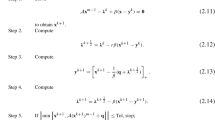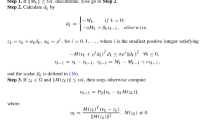Abstract
The conjugate gradient (CG) method is considered for solving the large and sparse indefinite least squares (ILS) problem min x (b−Ax)T J(b−Ax) where J=diag (I p ,−I q ) is a signature matrix. However the rate of convergence becomes slow for ill-conditioned problems. The QR-based preconditioner is found to be effective in accelerating the convergence. Numerical results show that the sparse Householder QR-based preconditioner is superior to the CG method especially for sparse and ill-conditioned problems.
Similar content being viewed by others
References
Bojanczyk, A., Higham, N.J., Patel, H.: Solving the indefinite least squares problem by hyperbolic QR factorization. SIAM J. Matrix Anal. Appl. 24, 914–931 (2003)
Björck, A.: Numerical methods for least squares problems. In: Frontiers in Applied Mathematics. SIAM, Philadelphia (1996)
Björck, A., Yuan, J.Y.: Preconditioners for least squares problems by LU factorization. Electron. Trans. Numer. Anal. 8, 26–35 (1999)
Chandrasekaran, S., Gu, M., Sayed, A.H.: A stable and efficient algorithm for solving the indefinite linear least-squares problem. SIAM J. Matrix Anal. Appl. 20, 354–362 (1998)
Chandrasekaran, S., Golub, G.H., Gu, M., Sayed, A.H.: An efficient algorithm for a bounded errors-in-variables model. SIAM J. Matrix Anal. Appl. 20(4), 839–859 (1999)
Chen, Y.T.: Iterative methods for linear least squares problems. Technical Report CS-75-04, University of Waterloo, Canada (1975)
Davis, T.: Direct Methods for Sparse Linear Systems. SIAM, Philadelphia (2006)
Davis, T.: The University of Florida Sparse Matrix Package. http://www.cise.ufl.edu/research/sparse/CSparse/
Hassibi, B., Sayed, A.H., Kailath, T.: Linear estimation in Krein spaces. Part I: Theory. IEEE Trans. Autom. Control 41, 18–33 (1996)
Sayed, A.H., Hassibi, B., Kailath, T.: Inertia properties of indefinite quadratic forms. IEEE Signal Process. Lett. 3, 57–59 (1996)
Van Huffel, S., Vandewalle, J.: The Total Least Squares Problem: Computational Aspects and Analysis. SIAM, Philadelphia (1991)
Author information
Authors and Affiliations
Corresponding author
Additional information
This work was supported by the National Natural Science Foundation of China (11001167) and Shanghai Leading Academic Discipline Project (J50101).
Rights and permissions
About this article
Cite this article
Liu, Q., Li, X. Preconditioned conjugate gradient methods for the solution of indefinite least squares problems. Calcolo 48, 261–271 (2011). https://doi.org/10.1007/s10092-011-0039-8
Received:
Accepted:
Published:
Issue Date:
DOI: https://doi.org/10.1007/s10092-011-0039-8




